Is your existing boiler struggling to keep up? Maybe it’s outdated, inefficient, or just plain unreliable. You’re tired of skyrocketing heating bills and dealing with uneven warmth throughout your home. Sound familiar? It might be time to consider a boiler replacement—and with the right boiler installation, you can enjoy improved efficiency, comfort, and peace of mind.
Here’s the good news: upgrading to a new boiler system doesn’t have to be stressful. Whether you’re unsure where to start, deciding between a conventional boiler and a more efficient boiler like a condensing or combi boiler, or trying to choose the right one for your home and budget—we’ve got you covered.
But wait—there’s more to it. Did you know what to watch out for when hiring a contractor to install it? Yikes!
In this post, we’ll simplify everything for you. You’ll learn about the different types of boilers, their pros and cons, and what to expect during the installation process. Plus, we’ll highlight common pitfalls to avoid so you can save money and enjoy hassle-free heating.
Ready to take the first step? Contact SuperTech HVAC today, and let us make your boiler installation smooth, efficient, and worry-free. Reliable warmth is just a call away!
Get The Best Help You Can With Your Boiler
How Boilers Heat Your Home: Types, Fuel Options, and More
Let’s talk about boilers! Unlike furnaces that blow warm air through ducts, boilers work by heating water. This hot water (or steam in older systems) flows through pipes to radiators, baseboard heaters, or even radiant floor systems. The result? Consistent, quiet, and evenly distributed heat without the need for ductwork. We’ve included this helpful video to give you a better understanding of how a boiler works.
Now, which boiler type is right for you? If you have higher heating or hot water demands, a conventional boiler might be your best bet since it uses separate tanks for hot water storage. Want to save on energy bills? A condensing boiler recycles wasted heat for maximum efficiency. And if space is tight, a combi boiler can handle both heating and hot water in one compact unit.
But wait, there’s more! Boilers also vary by fuel type. Natural gas is the most common and budget-friendly option, but don’t worry if you don’t have gas lines—propane and oil boilers can do the job just as well. For a rare, eco-friendly alternative, a biomass boiler uses organic materials like wood pellets.
Choosing the right boiler comes down to your home’s size, your heating needs, and your budget. Ready to make your home warm and cozy? Let’s dive into your options!

Boiler Comparison
What to Consider When Choosing New Boilers
Ready to choose the perfect boiler? Let’s break it down step by step so you can make an informed decision without the overwhelm.

Heating Capacity
Choosing the right boiler size is critical. Too small, and your home won’t stay warm. Too large, and you’ll waste energy—and money. A professional assessment can help match your new gas boiler to your home’s exact needs.
Boiler Manufacturer
In Maryland, leading boiler brands include Columbia, Weil-McLain, Burnham, Triangle Tube, Rinnai, NTI, and Bosch. While brand reputation matters, proper installation is everything! Even the best boiler will perform poorly if installed incorrectly.
Efficiency
Want to save on energy bills? Look for high-efficiency condensing or combi boilers, which operate above 90% efficiency. While these models cost more upfront, they can slash your energy costs in the long run.
Space Needs
Got a small home? A combi boiler is compact and skips the need for extra tanks. Conventional boilers, though reliable, take up more space with their additional components.
Boiler installation Cost
Switching to a high efficiency boiler may require updates like new venting, which can add to the cost. The upside? Long-term savings make it a smart investment.
Maintenance
Regular tune-ups keep your new boilers running efficiently and extend its life. High-efficiency boilers may need specialized care, but the performance is worth it.
Rebates and Incentives
Did you know energy-efficient boilers often qualify for rebates? Programs offering incentives for models with 90%+ efficiency can ease the upfront cost.
The takeaway? Consider your home’s heating needs, space, and budget—and don’t skip a professional consultation. An expert assessment ensures you’ll get the right boiler for years of efficient, reliable warmth.
Let Baltimore's Top HVAC Contractor Service You
Is a Conventional Boiler Right for You?
After considering tips for selecting the right boiler, thinking about a conventional boiler? Let’s dive into the benefits and challenges so you can decide if it’s the right choice for your home.
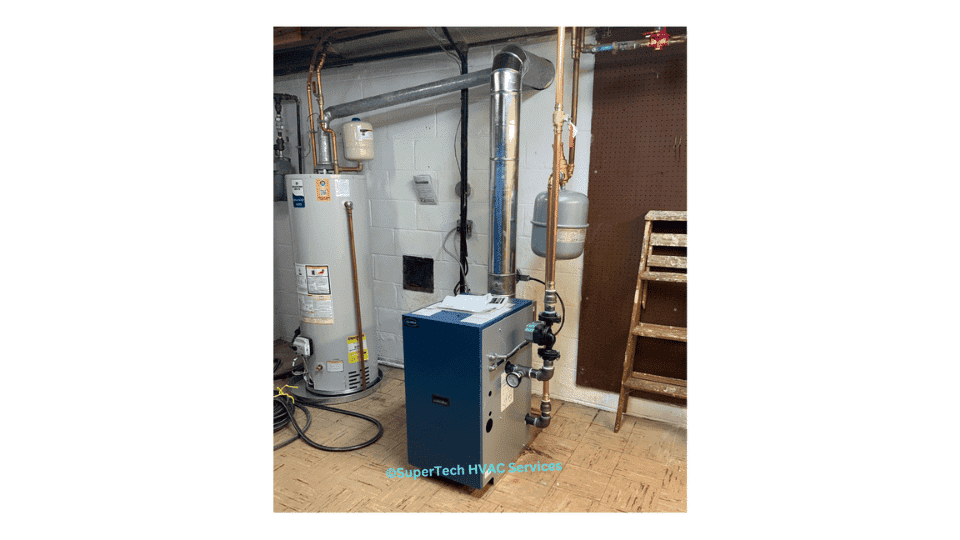
Why Choose a Conventional Boiler?
Durability is a big win here—conventional boilers last 15–30 years, far longer than furnaces, which usually tap out at 10–15 years.
And let’s not forget the comfort: boilers deliver even, consistent warmth without the drafts or uneven temperatures that forced-air systems can create. Plus, if you’re worried about indoor air quality, boilers don’t blow around dust or allergens, making them a cleaner option for your home.
Challenges to Consider
Conventional boilers require more space for tanks and radiators, which can complicate your home’s layout. They’re also less energy-efficient than modern condensing boilers, which could mean higher energy bills.
The cost of installation can be steep, thanks to the labor-intensive process and the need for specialized components. And here’s the kicker: not every contractor is skilled in boiler installation service, so you’ll need to choose carefully.
Watch Out for These Installation Issues
Improper venting is a big one. Since boilers often run on natural gas, poor venting could lead to dangerous carbon monoxide leaks. Water leaks from faulty installation can damage your home, and older boilers are prone to annoying operational noises if not maintained well.
If you’re looking for a system with rock-solid durability and cozy, even heating, a conventional boiler might be your answer. But if you want higher efficiency and lower costs, exploring condensing or combi boilers could be the better move.
Condensing Boilers: What to Know Before Making the Switch
Ever heard of a boiler that recycles heat? That’s what a condensing boiler does. By capturing and reusing heat from flue gases, it achieves efficiency levels of over 90%, saving energy and slashing heating costs. But before jumping in, let’s talk about the pros and cons.
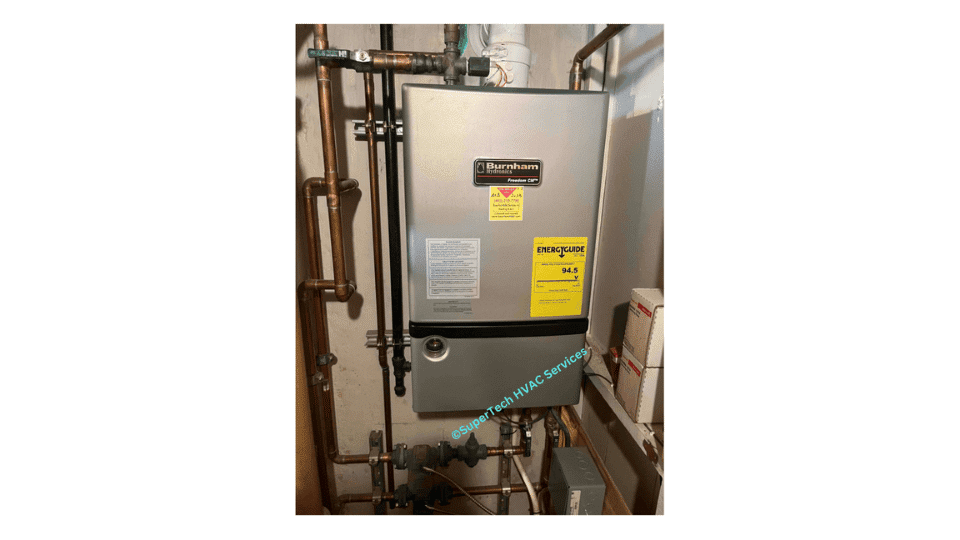
Ready to Install Your Boiler? Let’s Make It Happen
Why Choose a Condensing Boiler?
The biggest draw? Efficiency! Condensing boilers use less fuel to generate heat, which means lower energy bills. Over time, the savings can easily offset the higher upfront cost—making this heating system perfect for homeowners planning to stay put.
What Are the Drawbacks?
Be ready for a higher price tag at the start. The advanced technology and components make these systems pricier to purchase and install. Plus, installation and maintenance are more complex, which can bump up costs further.
And here’s a heads-up: In freezing temperatures, the condensate pipe (which drains water from the boiler) can freeze, causing blockages. Proper insulation can help avoid this hiccup.
Thinking About Converting?
Here’s What to KnowSwitching from a conventional boiler? You’ll need to budget for venting updates since condensing boilers use PVC vents instead of traditional metal flues. They also produce water during operation, so you’ll need an efficient drainage system to prevent water damage.
Good news: Condensing boilers typically work with your current radiators. However, depending on your home’s heating needs, you might need to resize or replace them for maximum efficiency.
While condensing boilers boast unmatched energy savings and long-term benefits, they require careful planning and professional installation. Ready to explore another high-efficiency option? Up next: combi boilers!
Combi Boilers: Are They Right for You?
Looking for a compact, efficient heating solution? A combi boiler (short for combination boiler) might be your perfect match. This high-efficiency heating system combines a boiler and water heater into one unit, heating water on demand. It saves space, eliminates the need for water tanks, and offers unmatched convenience. But is it the right fit for your home? Let’s dive in.
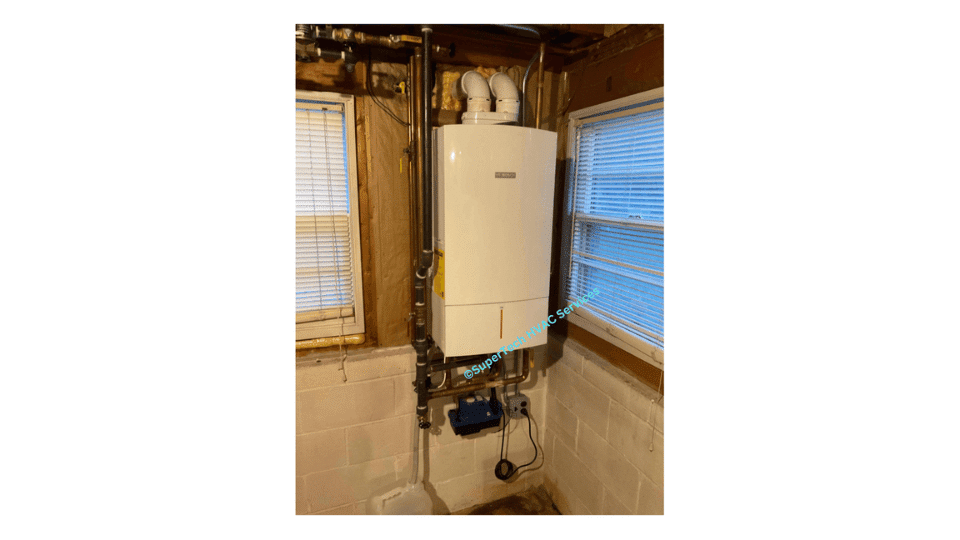
Why Choose a Combi Boiler?
If space is at a premium, a combi boiler is a game-changer. Without the need for a separate water tank, it’s ideal for small homes and apartments. On top of that, it’s super-efficient—heating water only when you need it, so no energy is wasted storing hot water.
Convenience is another big win. Combi boilers deliver unlimited hot water instantly. Whether it’s a shower, heating, or both, the system keeps things running smoothly without the wait.

Boiler in closet needs more space consider combi
What Are the Drawbacks?
Here’s the catch: Combi boilers can struggle to supply hot water to multiple outlets at once. For larger households with several bathrooms, this could mean a drop in water temperature if everyone’s using hot water simultaneously.
Low water pressure? That’s another consideration. Since combi boilers rely on your mains water pressure, you might need a pressure booster if it’s not strong enough. Also, over time, sediment and scale can build up, potentially clogging the system. A water treatment solution can help prevent this.
Converting to a Combi Boiler?
Here’s What to KnowSwitching to a combi boiler? You’ll need to account for a few upgrades. First, the old water tanks and cylinders will need to go, freeing up valuable space. You may also need to update your flue system to PVC and install a condensate drain for water discharge.
Re-piping might be required to ensure compatibility with your new system. And don’t forget your radiator—depending on your home’s heating needs, resizing or replacing them might be necessary. Lastly, if water pressure is an issue, plan to install a booster pump for consistent performance.
A combi boiler offers incredible efficiency, space-saving design, and on-demand hot water. But the conversion process takes careful planning and expertise. Ready to upgrade? A professional HVAC team will make sure the transition is seamless, leaving you with a system built for comfort and efficiency.
Why a Professional Team is Essential for New Boiler Installation or Conversion
Boiler service, including boiler repair, installation and conversion, is a job for the expert. Installing or upgrading a boiler is more than just connecting pipes—it requires expertise to ensure efficiency, safety, and longevity. A poorly installed system can lead to heating issues, frequent breakdowns, and costly repairs. Here’s why professional installation is crucial:
ADD PIC8: team installing boiler
Proper Piping Prevents Air Pressure Issues
Flawed piping can trap air, leading to pressure buildup and uneven heating. Professionals make sure pipes are installed correctly, following the manufacturers specifications of piping schematic. This ensures smooth water circulation and optimal performance.
Correct Expansion Tank Setup
The expansion tank helps regulate pressure as water heats and expands. Without it or if it is not installed correctly, excess air can accumulate in the system, leading to short cycling and premature wear. Professionals ensure the tank is properly sized and positioned to maintain stable pressure and ensure efficient operation.
Pro-Press Connections for Leak Prevention
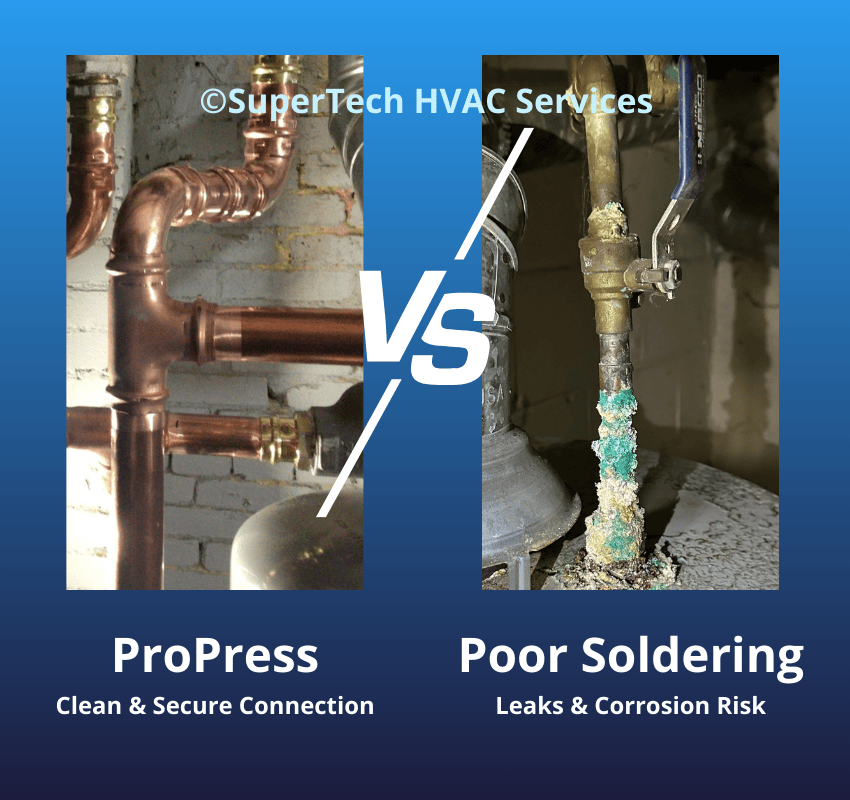
Poor pipe connections can lead to leaks, inefficiencies, and costly repairs. Pro-Press fittings provide stronger, cleaner, and more reliable seals than traditional soldering, ensuring a safer, long-lasting system.
Cutoff and Isolation Valves for Easy Maintenance
Without cutoff and isolation valves, repairs require shutting down the entire system. Properly placed valves allow quick servicing and better flow monitoring, reducing downtime and troubleshooting complexity.
Backflow Preventer for Safety
Without a backflow preventer, contaminated boiler water can mix with drinking water, posing health risks. A professional installation ensures this critical safety component is in place.
Ready to Install Your Boiler? Let’s Make It Happen
Boilers have plenty of perks—quiet operation, even heating, and better air quality are just the beginning. With a lifespan of 15–30 years, they outlast heat pumps and deliver steady, customizable warmth through radiators, baseboards, or radiant floors. Best of all? No ductwork needed!
But here’s the catch: even the best boiler won’t perform well without proper installation. That’s where the pros come in. A professional contractor ensures your system runs efficiently, safely, and reliably—saving you from costly headaches down the road.
If you’re in Maryland, look no further than SuperTech HVAC. Our expert team makes boiler installation a breeze, handling everything from site assessments to final setup. We’re here to deliver lasting comfort and peace of mind.
Want more tips on choosing the right HVAC contractor? Head over to our blog to see why SuperTech is the smart choice for your professional boiler installation. Let’s get your home ready for cozy, efficient heating!
Frequently Asked Questions
Q1: How long does a gas boiler installation take?
A1: A gas boiler installation typically takes 1–2 days, depending on the complexity of the system and whether additional work, such as removing old equipment or modifying pipework, is required.
Q2: How are boiler replacement or installation costs calculated?
A2: Installation costs depend on factors such as the type of boiler, labor involved, system modifications, and any additional components like flues or condensate drains. A professional assessment can provide a detailed and accurate estimate.
Q3: Are any permits required?
A3: Yes, permits may be required for boiler install to ensure compliance with local building codes and safety standards. Your HVAC installer will usually handle this process on your behalf.
Q4: What is the lifespan of a boiler?
A4: Most boilers last 15–30 years with proper maintenance, depending on the type and quality of the system. Regular servicing can help extend its lifespan and maintain efficiency.
Q5: How can I ensure my boiler runs efficiently?
A5: To keep your boiler running efficiently, schedule regular maintenance, bleed radiators, check for leaks, and ensure proper water pressure. Upgrading to a high-efficiency model and using programmable thermostats can also optimize performance.
